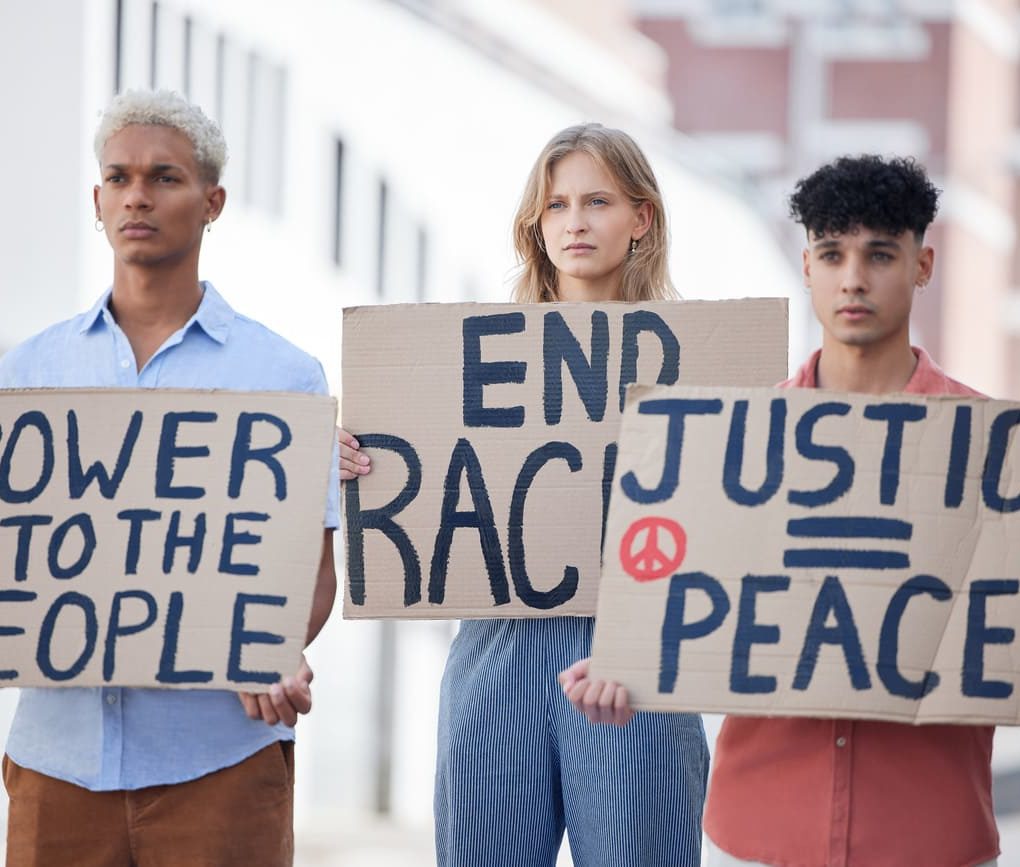
The Fee Is Free Unless You Win.
Top Rated Employment Law Firm
Protecting Families Since 1995
$450 Million Won
TABLE OF CONTENTS
Race discrimination in Philadelphia is when an employer, co-worker, supervisor, or company associate unfairly treats or harasses a job applicant or employee because off his or her race. Race is defined as a group of people who share physical characteristics, such as facial features, hair texture, bone structure, eye shape, and more. Race discrimination in the workplace is illegal and should not be tolerated. Derek Smith Law Group’s experienced attorneys have helped victims of race discrimination battle this type of injustice for the past 25 years.
Race discrimination in the workplace is when an employee or job applicant is harassed or unfairly treated by his or her supervisor, employer, co-worker, or anyone associated with the business simply because of race. Race discrimination may target the following:
All races are protected from race discrimination, whether an employee or job applicant is white/Caucasian, black/African American, Hispanic/Latino, Asian American, Middle Eastern, or a member of any other race. Furthermore, racial discrimination can occur between people of the same race or people of the same race.
Race discrimination in the workplace can come in many forms. The general rule is that discrimination is caused by the actions or comments that make the workplace uncomfortable. Some examples of race discrimination include:

In order to prove race discrimination in Philadelphia, there must be either direct comments, direct or indirect actions, or racially discriminatory policies.
Direct evidence is when an employer, co-worker, supervisor, or associate intentionally or unintentionally says to an employee or job applicant that he or she was treated unfairly because of his or her race. For instance, this can be a comment that a job applicant was not hired because of his or her race or that an employee was fired because of his or her race. This also can be the racial slurs and comments that are said in the office or sent via email. Direct evidence can be in writing or verbal.
Another type of evidence is Disparate evidence. These are actions that are deemed racially discriminatory. They typically relate to a culture that is seen within the office. For instance, when a black employee is qualified, but passed over for the promotion that was given to an equally or less-qualified employee who happens to be white, that is an action that can be used as disparate evidence. If you can show that a person is being treated unfairly because of his or her race while other employees who may not be as qualified or as hard-working are receiving better treatment, then you have disparate evidence.
Finally, discriminatory policies can be evidence of race discrimination in the workplace. If a firm has a policy that certain styles of dress that target certain races, like prohibiting people from wearing a Sari to work, which would target Indian Americans, that would be an example of discriminatory policy and can be used as evidence of race discrimination in the workplace.
A claim of Race Discrimination in Philadelphia under Title VII can be filed with the Equal Employment Opportunity Commission (EEOC) within 300 days of the last incident of discrimination. Once the claim is filed, the EEOC will investigate the claim and issue a Right to Sue letter giving you permission to file your complaint in federal court.
The time limit to file a claim under the Philadelphia Fair Practices Ordinance is one year from the date of the last incident of discrimination.
Each lawsuit has its own set of challenges Therefore when it comes to race discrimination cases in Philadelphia, the types of damages can vary. Most settlements will include several types of damages, such as:
The punitive damages are supposed to “punish” the employer for the actions that led to the lawsuit. The idea is to hit the employer where it hurts; in the bank account. Therefore, depending on the size of the employer, the nature of the race discrimination claims, and the revenue of the employer, you may receive settlements anywhere from a few thousand dollars to over a million dollars.
If you are the victim of racial discrimination in the workplace, you likely want to be done with the claim as quickly as possible. A lawsuit for race discrimination in the workplace in Philadelphia can last anywhere from 4 to 6 months from the receipt of the Right to Sue Letter to 1 year or longer. If your employer (or the defendant) is willing to negotiate a fair settlement prior to going to trial, the process may be completed in 4 to 6 months.
However, if the defendant refuses to negotiate fairly, the case will go to trial. Preparation for trial will take a few months to almost a year, while the case will spend anywhere from a few days to a month or so in front of the judge and jury.
In order to avoid appearing racist, individuals and companies may make a habit of hiring more minorities giving more work and better money to those of other races, instead of people who are Caucasian. This practice is race discrimination and has often been known as reverse racism and is just as illegal as any other type of racial discrimination. The law is clear that no person should be singled out because of their race. It does not matter the race. Any type of racial discrimination is illegal.
Discover how our expertise has helped clients overcome their legal challenges and achieve successful outcomes.
View All TestimonialsOlivia is the best! Oliva was very thorough, patient, and very detailed and descriptive regarding the process. She was very supportive of my sexual harassment case. From the very beginning, she communicated and would provide me with any updates and she was always available when I needed anything. More importantly, she always extended that comfort level of trust which always made me feel at peac... Read Full Testimonial
Casey Barkhordarian is a fabulous attorney to work with. He explained everything to me about the case (including the millions of questions I asked) right from the start of our very first meeting. He did so in a way that I could understand and was very prompt and clear with communication the entire time. Casey Barkhordarian is a very competent and knowledgeable lawyer to have on your team. I def... Read Full Testimonial
Matt Finkleberg is by far the best attorney I’ve ever hired! From the outset, it was evident that he was not just another lawyer; Matt is nothing short of extraordinary. He possesses the ability to do his job phenomenally while somehow managing to give me hope during one of my darkest of hours. Matt consistently returned my calls promptly, regardless of my questions, confusion, or self-doubt ... Read Full Testimonial
I cannot speak highly enough about my experience working with Matt Finkelberg. From the very beginning, Matt approached my case with an incredible level of professionalism, knowledge, and dedication that immediately put me at ease. It is rare to find an attorney who not only possesses an impressive depth of legal expertise but who also truly cares about the well-being and best interests of thei... Read Full Testimonial
Olivia is absolutely outstanding! She understands the emotional side of your case while being able to find the legal aspects of holding the employer accountable for breaking the law! Made a really terrible situation a little easier by explaining everything and helping me get everything in order and in the right hands. I would not use anyone else! Call them for any sexual harassment case... You ... Read Full Testimonial
This law firm is absolutely amazing!!! They went so above and beyond for me!!! I am so grateful for all their help with my difficult case!!! If you need a lawyer, you will be in great hands with their firm!!! And wait until you see the office! The building is so high tech I couldn't figure out how to get in the elevator lol!
It was a pleasure to have Casey represent and help me for my employment case. It was my first time needing an attorney, so I was a bit apprehensive at first – Casey took the time to answer all of my questions and fully explain everything to me, which really put me at ease. He was very attentive, supportive, and knowledgeable throughout the whole process – Casey would ask questions to ensure... Read Full Testimonial
matt is an excellent attorney. he handled my case with the utmost care and highly exceeded all expectations. i could not recommend derek smith and esp. matt finkelberg enough
matt is an excellent attorney. he handled my case with the utmost care and highly exceeded all expectations. i could not recommend derek smith and esp. matt finkelberg enough 🙂
Matt handled a suit against the City of LA and members of the a Neighborhood Council for racial discrimination and harassment. Ths was the first suit of this type filed on a Neighborhood Council Matt handled it with poise and above all professionalism. He walked me through the 3 year process and above all provided moral support and encouragement as I still experienced racism and harassment duri... Read Full Testimonial
Matt Finkelberg is Amazing and Devotional! It was a pleasure to have Matt represent me for my employment case. He was very attentive, supportive, and knowledgable throughout the whole process. Whenever I reached out he responded promptly which I greatly appreciated. Matt fought diligently and hard throughout my case to make sure my case was represented best. Thank you again Matt for everything.... Read Full Testimonial
It was a pleasure to have Casey represent and help me for my employment case. It was my first time needing an attorney, so I was a bit apprehensive at first – Casey took the time to answer all of my questions and fully explain everything to me, which really put me at ease. He was very attentive, supportive, and knowledgeable throughout the whole process – Casey would ask questions to ensure... Read Full Testimonial
Our dedicated attorneys are ready to fight for your workplace rights and ensure justice!
Title VII of the Civil Rights Act of 1964 and the Philadelphia Fair Practices Ordinance makes it illegal to discriminate against any person based on race in a workplace of 15 or more employees. This means that an employer may not make employment decisions of any kind based on race, whether they be positive or negative. Furthermore, the law does not name any particular race as a protected class.
When it comes to workplace race discrimination, the more proactive you are, the better your case will be. Here are some things you can do before filing your claim:
No one should have to be subject to race discrimination in making decisions regarding hiring, firing, promotions, training, benefits, compensation, or other employment-related issues.
If you are the victim of workplace race discrimination in Philadelphia, the experienced attorneys at Derek Smith Law Group in Philadelphia can help.
Contact us today at (215) 391-4790 for a free consultation. We do not collect any money until you win your case.

Our experienced legal team provides reliable services in key U.S. cities, ensuring expert assistance for workplace discrimination and employment law matters wherever you are located.
Our experienced employment lawyers are dedicated to resolving your workplace rights concerns with expertise and care.